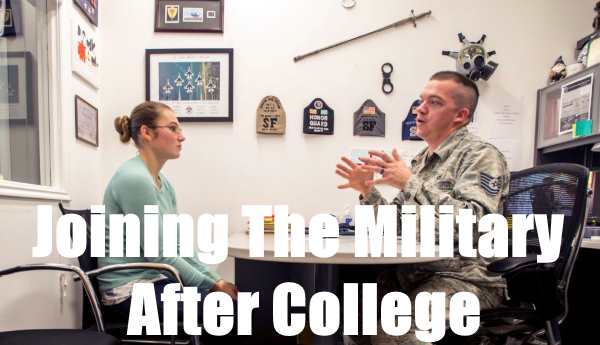Becoming a member of the military is a big commitment. Some people are ready to take that step the minute they graduate from high school.
Others pursue a 4-year college degree while participating in military activities as part of a Service Academy or Reserve Officer Training Corps (ROTC) Unit. Others decide that they want to serve after completing their college degree.
What options are there for those who wait until after college or even after spending time in another career to join the military? Are there any additional benefits offered?
Related Article – American Military University (AMU) Reputation: Worth It? (2019 Review)
Jump To A Section
Officer track and Enlisted track
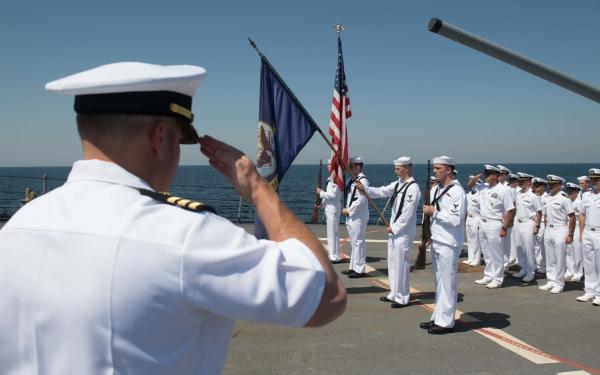
Each branch of the military—Army, Navy, Air Force, Marine Corps, and Coast Guard—are organized into Officer and Enlisted service members.
Strictly speaking, Officers outrank Enlisted but the two paths are designed to work side-by-side and each brings different skills and focus.
Enlisted military members do the hands-on work of the military. They often receive specialized training and become technical experts as they progress through their careers.
Senior Enlisted members are responsible for personnel management and mentorship of both Enlisted and Junior Officers.
A 4-year college degree is not required to enlist in the military, although there are numerous opportunities to get a degree once you are serving or after you complete your time obligation.
Military officers lead groups of enlisted and fellow officers, with size and level of responsibility increasing as they become more experienced.
Their training and job performance evaluation focus on leadership and increasingly complex decision-making to impact overall policy and mission direction.
To join as an officer, you must have a 4-year degree. Those in pursuit of a degree may be able to become part of an officer training program while they attend college, such as ROTC.
There are limited opportunities for senior Enlisted members to become Officers or to serve as Warrant Officers, Limited Duty Officers, or in another capacity.
These individuals bring the technical expertise and specialized experience of the Enlisted ranks to the big picture strategy of the Officer corps.
What to expect at the recruiter’s office
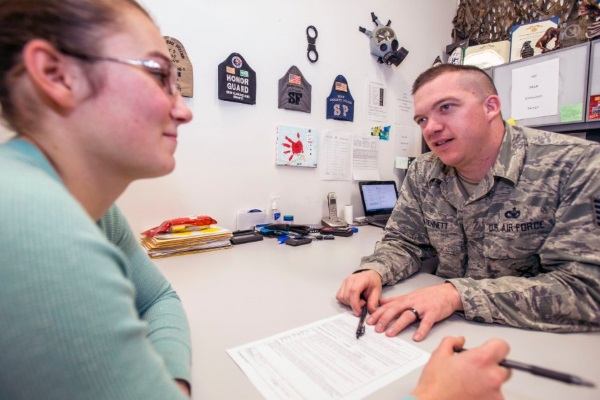
Anyone interested in joining the military will most likely start at the recruiter’s office. A recruiter is someone currently serving in the military whose job it is to educate the public and entice eligible candidates to serve.
There are separate Enlisted and Officer recruiters, so it is important to have an idea of which path you are interested in before you visit.
The recruiter will talk to you about what kind of future you want with the military.
Each branch has their own recruitment office and program, so they will only be able to tell you about paths within the branch of service they represent.
Questions your recruiter may ask:
- What kind of job do you want to have in the military?
- What is your family situation like?
- What level of school have you completed?
- Do you want to complete a college degree or advanced degree?
Questions you should ask the recruiter:
- What options for student loan repayment are there?
- What specialties are available that match my skills and education?
- What service time obligation does each path require?
- What opportunities are there for further education?
Related Article: 41 Questions To Ask A Military Recruiter
There are a lot of financial benefits for education that come with joining the military. Some are available to everyone, while others only apply in certain situations.
Make sure that you ask your recruiter BEFORE joining about available programs. Some require that you join under specific circumstances to be eligible.
Once you join, you will need to complete some version of introductory training. For enlisted members, this is most often the basic training course.
Officer candidates complete a similar course, called the Officer Candidate School.
Each service administers its own program, which your recruiter will explain in detail.
All courses are designed to help you learn what is expected of members of the military and transition from civilian to service member.
College loan repayment

If you took out student loans to pay for college, you may be able to have the military pay them for you. Through service-specific Student Loan Repayment Programs, new military members can have their existing student loans paid by the military as an incentive to join.
Eligible student loans, which were incurred before the new service member joined the military, include:
- Federal Subsidized or Unsubsidized Stafford Loans
- Federal Direct Student Loans or Perkins Loans
- Federal Direct Consolidated Loans
- Federal Direct Parent Loans for Undergraduate Students
So how much will the military repay? There are limits and they vary by service.
Overall, the Army and Navy will pay up to $65,000. The National Guard and Coast Guard will pay up to $50,000 and $30,000, respectively. The Air Force will pay up to $10,000.
Each service makes annual payments towards the balance of student loans.
Members must enlist or earn a commission as an Officer for at least 3 years to be eligible for the program.
Some specialties receive higher amounts than others, which can be determine when talking to a recruiter.
Using the Student Loan Repayment Program also has an impact on GI Bill benefits for new service members. Normally, military members start earning tuition and living expense benefits to be used for education in the future under the GI Bill.
Those taking advantage of the Student Loan Repayment Program are not eligible to start accruing GI Bill benefits (which also have a service time obligation) until their initial 3 years are complete.
Related Article – Navy Signing, Enlistment, and Reenlistment Bonuses
College costs for medical professionals
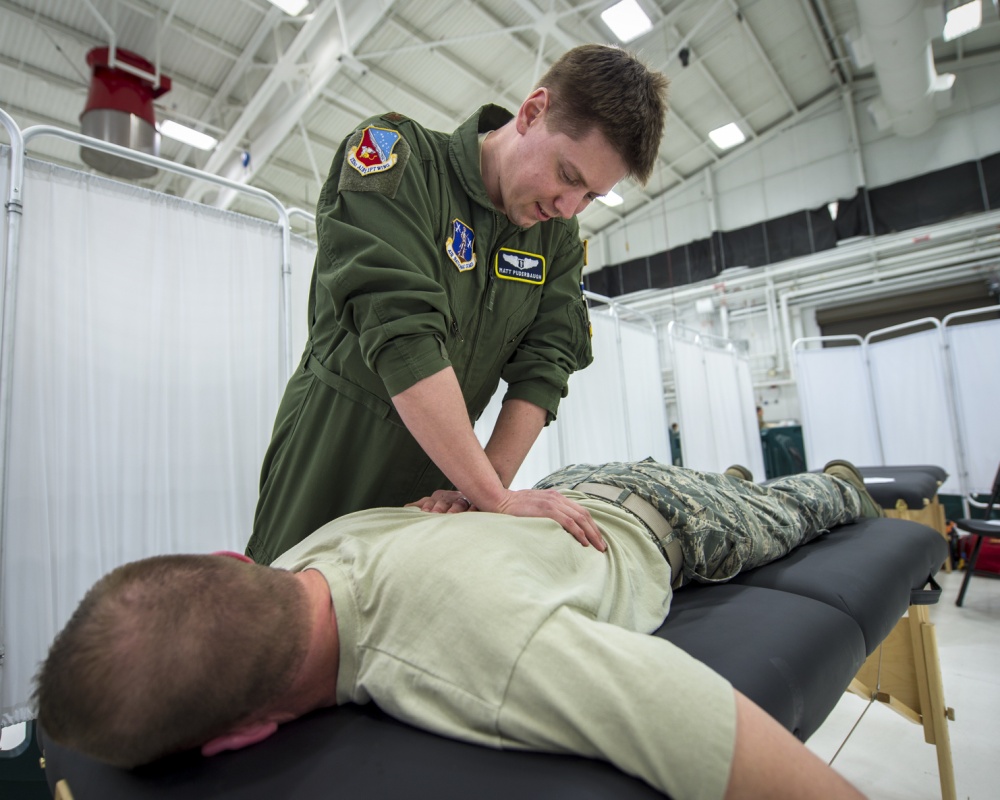
Some of the best financial incentives to joining the military exist for healthcare professionals.
With 4-year medical school costs ranging from $150,000 to almost $400,000, it is no surprise that newly graduated medical professionals are looking for programs the help pay their medical school loans while providing rewarding and challenging experiences.
Health Professions Loan Repayment Program
The Health Professions Loan Repayment Program provides 4th year medical students or residents pursing a specialty to join the military and have part or all of their existing student loans paid.
To be eligible to apply, prospective military members must currently be enrolled in an approved program, agree to serve for a designated amount of time, and be pursing a health profession that is needed by the military.
If approved, participants receive up to $40,000 annually for 3 years. It is important to note that 25% of that amount is withheld for taxes, which may be given as part of a tax refund through the IRS.
There are also a number of bonuses available for those in highly-needed medical fields. These are often practitioners with highly specialized skills which require advanced training, but it is worth discussing with the recruiter to see if you are eligible.
Health Professions Scholarship Program
Those interested in joining the Army, Navy, or Air Force can take advantage of a scholarship to attend medical or dental school.
The scholarship includes full tuition and fees, health insurance reimbursement, other school-related expenses, and even a monthly living stipend.
If you want to pursue a career in medicine and join the military, this is a great option to take full advantage of the financial incentives that come with that path.
The program is open to those with an undergraduate degree who are applying for medical or dental school, as well as those currently enrolled in medical or dental school.
Related Article – Air Force Signing, Enlistment, and Reenlistment Bonuses
Uniformed Services University of the Health Sciences
Another option for those with a college degree who want to become military health professionals is the Uniformed Services University of the Health Sciences, located in Bethesda, Maryland.
The school’s mission is to “educate, train, and comprehensively prepare uniformed services health professionals, scientists, and leaders to support the Military and Public Health Systems, the National Security and National Defense Strategies of the United States, and the readiness of our Uniformed Services.”
Doctoral and Master’s programs are available in a variety of fields. To be admitted, students must have completed a 4-year degree but do not need to be currently serving in the military.
While many new students have prior military service, it is not required for admission.
While at USU, students are in the active duty military and are compensated appropriately.
Students do not pay tuition but are obligated to 7 years of service in the Army, Navy, Air Force, or U.S. Public Health Service after graduation.
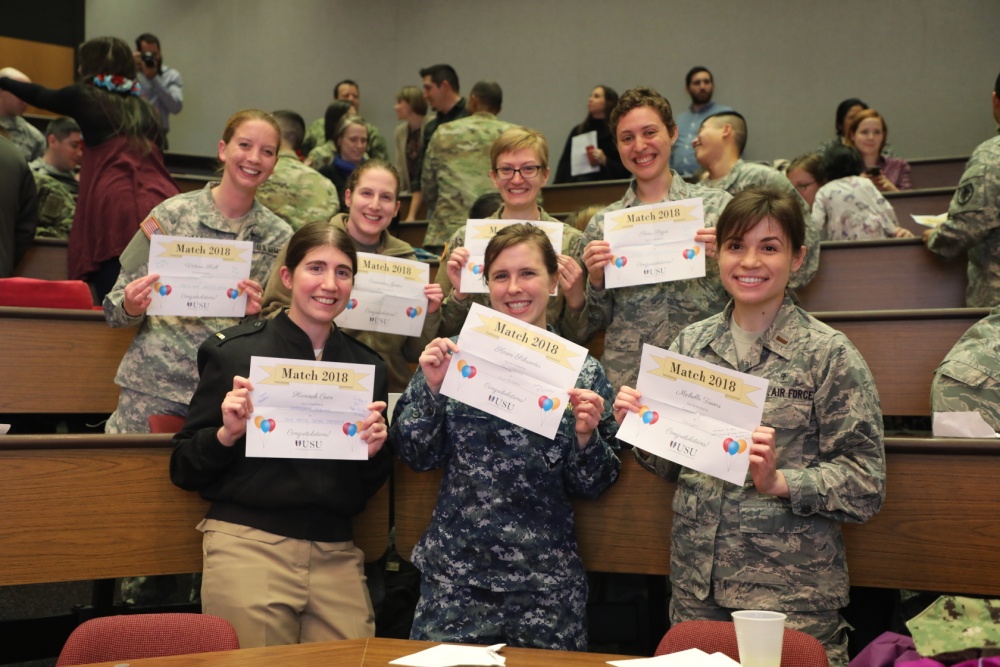
Accelerated promotion
If receiving student loan repayments or tuition for a degree in the health professions is not enough incentive, the military also recognizes the increased level of responsibility and skill that newly commissioned officers in certain specialties possess.
Those graduating with advanced degrees in the healthcare field or law, even if they did not use another incentive program, may be eligible for accelerated promotion.
For current medical students and residents
Medical students using the Health Services Scholarship Program or attending the Uniformed Services University of the Health Sciences will serve as Second Lieutenants in the Army or Air Force or as Ensigns in the Navy.
Once they graduate and join the rest of the service, they will automatically be promoted to Captain in the Army or Air Force or Lieutenant in the Navy.
For fully-licensed physicians
If you have completed medical school and residency and are joining the military as a licensed physician, you will typically join at the rank of Captain or Lieutenant. In some cases, individuals with more experience may be able to join at an even higher rank.
Accelerated promotion means increased responsibility from the first day, more authority, and a higher paycheck.
There are also a variety of signing bonuses for licensed physicians when they join the military. Bonus incentives vary by service, specialty, and time obligation.
For practicing lawyers
Lawyers who choose to join the military through the Direct Appointment Program will start at the rank of First Lieutenant in the Army or Air Force, Second Lieutenant in the Marine Corps, Lieutenant Junior Grade in the Navy, or Lieutenant in the Coast Guard.
The promotion path for each service varies but lawyers in the Air Force, Army, and Navy can expect to earn their first promotion within the first year of service.

Other paths to becoming an officer
How do all of these options compare to other paths to joining the military?
Because the majority of those joining the military with a 4-year degree will choose to become Officers, I have listed some other Officer commissioning programs below.
- Officer Candidate School: Those with a 4-year degree who are not interested in student loan repayment can join the military and pursue one of many specialties. They will attend Officer Candidate School, OCS, to complete their initial military training and go on for further training in their chosen field.
- Reserve Officer Training Corps: Prospective and current college students have the option to participate in military training while in college through the Reserve Officer Training Corps, or ROTC, program. ROTC programs are service specific and not all universities have ROCT units on campus. ROTC participants who use an ROTC scholarship commit to serving in the military following graduation.
- Senior Military College: Some institutions include a stricter military education as part of their curriculum, such as The Citadel in South Carolina or Virginia Military Institute. Students attend through the ROTC program but have more military training incorporated into their experience.
- Service Academy: Each branch of the service has a specific 4-year undergraduate institution that prepares students to become officers in their branch. Students attend for 4 full years and participate in summer training. The service covers all tuition and expenses. All graduates are commissioned as officers on graduation day and go on to serve a minimum service obligation in their respective service. Schools include the US Naval Academy, West Point, and the Air Force Academy.
Advanced degree opportunities
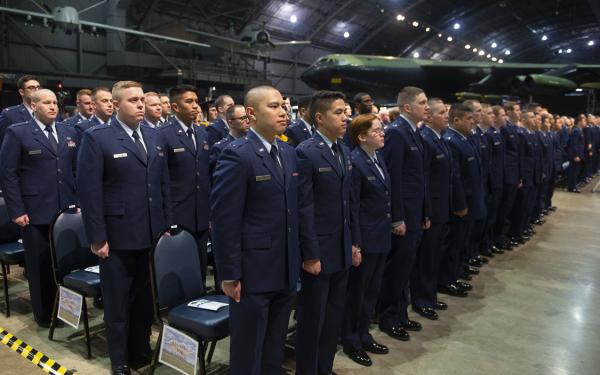
Joining the military with a completed 4-year degree may have you believing that you have maxed out your education benefits, especially if taking advantage of a student loan repayment or scholarship program.
But the military offers a number of opportunities to pursue advanced degrees at no-cost. Many even pay you to attend!
- Graduate Education Voucher: Through the GEV program, the military will pay for graduate level courses that active duty military members take in their spare time. A limited number of quotas open each year for currently serving members to pursue a degree in a field that they will be able to use in their military career.
- Naval Postgraduate Dental School: Students at the Naval Postgraduate Dental School can pursue one of many specialties while studying at the Walter Reed National Military Medical Center. Residents graduate to become board certified dentists in their specialty.
- Naval Postgraduate School/Air Force Institute of Technology: Active duty service members from all branches can get a Master’s degree from NPS or AFIT as part of their military service. While attending, they will be paid according to their rank and not pay tuition or other fees. A limited number of doctoral programs are available to certain specialties.
- Funded Legal Education Program: This program provides a path for currently serving Officers to pursue a law degree through the military. The program pays for in-state tuition while attendees get a law school degree.
There are numerous paths to becoming a member of the United States military.
If you are joining with a college degree, you may have the option to take advantage of financial incentives, accelerated promotion opportunities, or the chance to get an advanced degree as part of your military service.
Frequently Asked Questions
Is it better to join the military before or after college?
This is highly dependent on a number of factors, including what your long range goals are, what your financial situation is, and what job you plan on having in the future. Learn more about how to make that decision here.
What’s the best branch of the military to join after college?
Every branch of the military has their pro’s and cons, so there really isn’t a ‘best’ one to join after college. It all depends on your long-term goals, as well as other factors. Learn more about which branch of the military is right for you here.
What are the downsides to joining the military after college?
Among many other reasons, some of the downsides to joining the military right out of college include: Reduced social life, extremely stressful tasks, and you can’t just leave the military if you’re unhappy. Learn more about this here.
Should I go to college or join the military?
Both clearly have their upsides, and it’s really a matter of personal choice. If you are having any doubts at all about joining the military, then you probably should not join. Get more info here.
What are the best jobs in the military?
The best jobs in the military are ones that both interest you, and have considerable job opportunities in the civilian world. Some of these jobs include: Air Traffic Controller, Military Police, Corpsman, and Logistics Manager.
References:
- https://www.navy.com/joining-navy-if-you-havent-served
- https://www.cnrc.navy.mil/pages-nrc-links/navy-student-loan-repayment-program.htm
- https://www.military.com/education/money-for-school/student-loan-repayment.html
- https://www.med.navy.mil/sites/pubproto/Lists/Info_Pages/DispForm.aspx?ID=20
- https://www.thebalance.com/average-cost-of-medical-school-4588236
- https://www.goarmy.com/amedd/health-care/benefits.html
- https://www.shpep.org/scholarships-funding-opportunities/health-professions-scholarship-program-hpsp/
- https://www.usuhs.edu/about/mission
- https://www.medicineandthemilitary.com/officer-and-medical-training/military-officer-training
- https://www.jag.navy.mil/careers_/careers/jagpath.html
- https://www.law.virginia.edu/public-service/judge-advocate-general-faqs#eight
- https://www.navycollege.navy.mil/resources/gev.htm
- https://www.wrnmmc.capmed.mil/ResearchEducation/NPDS/SitePages/home.aspx
- https://my.nps.edu/
- https://www.afit.edu/index.cfm
- https://www.goarmy.com/jag/funded-legal-education-program.html
See Also
Joining The Military At 30: Here’s How To Do It
How To Find A (Nearly) Free Military School
- Coast Guard Grooming Standards - June 17, 2024
- Attending the Naval Academy Preparatory School - June 17, 2024
- Vet Tix Review: Your Go-To Guide - June 17, 2024
Originally posted on April 23, 2019 @ 4:42 am
Affiliate Disclosure: This post may contain affiliate links. If you click and purchase, I may receive a small commission at no extra cost to you. I only recommend products I have personally vetted. Learn more.
